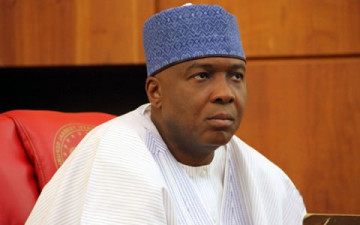There was drama at the Code of Conduct Tribunal (CCT) yesterday when Senate President Bukola Saraki refused to move into the dock when his case was called.
The dock is where those standing trial stay during proceedings.
Saraki’s refusal to leave his seat for the dock led to an argument between his lead counsel, Mahmud Magaji (SAN), and the prosecutor, Rotimi Jacobs (SAN).
Objecting to Saraki’s action, Jacobs said it was the practice for an accused “irrespective” of his status to enter the dock during his trial.
According to him, once an accused person’s plea is taken, he/she must always sit in the dock during proceedings.
“Things must be done properly. The proper thing is for him to go to the dock,” Jacobs said.
Magaji said there was no need for Saraki to enter the dock, citing Section 22(m) of the Evidence Act to buttress his submission.
But, tribunal Chairman Justice Danladi Umar overruled him, directing him to prevail on Saraki to do the right thing.
Shortly after Saraki moved into the dock, Jacobs sought an adjournment to enable the tribunal await the Court of Appeal’s judgment in the defendant’s appeal. The appeal court on Monday adjourned the verdict sine die (indefinitely).
Jacobs also acknowledged receipt of a fresh motion for stay of proceedings filed by Saraki’s legal team.
He said although the Administration of Criminal Justice Act (ACJA) 2015 frowns at a stay of proceedings in criminal cases, there was the need to await the appellate court’s verdict because it touches on the tribunal’s jurisdiction to further preside over the case.
A stay at this moment, he said, was reasonable in order to preserve the integrity of the court and of the legal profession.
Responding, Magaji, who had suggested an indefinite adjournment, said he would agree to the two-week adjournment suggested by Jacobs if the business of the court on the next date would be for parties to report the appeal court’s decision.
Magaji said it was necessary for him to remind the tribunal that his client’s trial was affecting his job as Senate President.
Jacobs objected to Magaji’s claim, saying the statement was intended to intimidate the tribunal.
“This is an intimidation of the tribunal. The defendant is a defendant. What is the essence of the rule of law?
He (Magaji) is saying that because the defendant is the Senate President.
“Are you saying he should not be treated like every other defendant, when the rule of law says even the king is subject to the law?” Jacobs said.
Ruling, Justice Umar said the tribunal would await the Court of Appeal’s judgment. He adjourned to November 5 for report of the appellate court’s decision and possibly, hearing of pending applications.
The tribunal, he said, would tarry a while in deference to the appellate court.
Saraki arrived at the tribunal around 9. 54 am, accompanied by some senators. The case was called at 10:45 am.
On September 22, Saraki pleaded not guilty to a 13-count charge of false asset declaration brought against him by the Code of Conduct Bureau (CCB).
He is querying the tribunal’s jurisdiction to try him at the appeal court.
Saraki is contending that the charge is defective, because it was not filed by a substantive Attorney General of the Federation and that the tribunal is not validly constituted because only two out of its constitutionally stipulated three members are currently sitting.
On October 8, the Justice MooreAdumein-led three-man panel of the Court of Appeal, sitting in Abuja granted accelerated hearing in Saraki’s appeal and promised to give judgment before his next appearance at the tribunal yesterday.
The Nation

